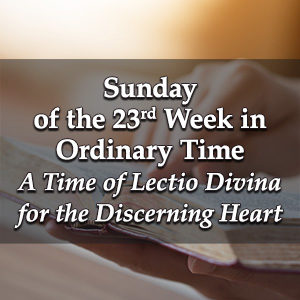Podcast: Play in new window | Download (Duration: 28:37 — 19.8MB) | Embed
Subscribe: Apple Podcasts | Spotify | Amazon Music | Android | Pandora | iHeartRadio | JioSaavn | Podchaser | Gaana | Podcast Index | Email | TuneIn | Deezer | Anghami | RSS | More

Fr. Aaron Wessman – The Church’s Mission in a Polarized World, Part 2 on Inside the Pages with Kris McGregor
In Part 2 of a 2-part conversation, Fr. Aaron Wessman and Kris McGregor discusses the challenges of living a Christian life in a polarized world, particularly the influence of social media and group dynamics. They explore how societal divisions amplify an “us versus them” mentality, which can distort one’s ability to live out Gospel values such as unity and love.
Fr. Wessman points out that while the church’s mission is to unite humanity with God and among themselves, current political and social climates often encourage division. The concept of “negative polarization,” where people are driven more by opposition to the other party rather than support for their own, is identified as a significant challenge. Politicians can manipulate this by stoking anger, leading Christians away from Gospel values like peace, patience, and kindness.
There is an importance of personal responsibility in bridging divides. The church’s mission, exemplified by figures like Jesus and St. Francis, involves crossing over to the “other” and engaging with people on the margins of society—whether they are of different races, cultures, or political views—rather than isolating oneself in a comfortable bubble. Advocating for “missional discipleship,” where Christians are called to be sent out into the world to engage with others in love, not to be conformed by the divisions in the world.
Fr. Wessman discusses the necessity of engaging with others humbly and courageously while being anchored in the Eucharist. He highlights that Christians are not called to withdraw from the world but to confront challenges by discerning the Spirit’s lead and engaging in “ministries of presence.” The Eucharist strengthens this mission, empowering Christians to be Christ’s presence to others.
They also address the need for humility and forgiveness in personal relationships, especially in areas of polarization within families, parishes, and even among fellow Catholics. Fr. Wessman encourages a culture of mercy and repentance, suggesting that real growth happens when people acknowledge mistakes, ask for forgiveness, and adjust their actions to better reflect Christ’s teachings.
 You can find the book here.
You can find the book here.
Discerning Hearts Reflection Questions
- How does social media affect your joy and spiritual life? Reflect on whether your engagement with social media fosters peace or leads to anger and despair.
- Are you aware of the “us versus them” mentality in your interactions? Consider how group dynamics may be shaping your perspective and distancing you from others.
- Is your political engagement rooted in the Church’s teachings? Evaluate whether your political views and actions are guided by Catholic social teaching or influenced by polarization.
- Do you actively seek to cross over to the “other”? Reflect on how you can engage with those on the margins, following Christ’s example of crossing boundaries.
- Are you anchored in the Eucharist? Examine how often you return to the Eucharist to strengthen your mission and align your life with Christ’s presence.
- Do you recognize when to engage and when to withdraw? Reflect on the discernment needed to know when to engage others and when to retreat for prayer and renewal.
- How do you foster unity within the Church and community? Consider how your actions either contribute to or hinder unity among fellow Catholics and within the broader community.
- Do you embrace humility and forgiveness in your relationships? Think about how you handle conflicts or mistakes, and whether you seek reconciliation and forgiveness in your interactions.
From the book description:
“Christians and other people of good will are longing for a response that can lead the way out of the divisiveness and vitriol of our times. I wrote this book to provide some assistance to readers to discern a way out of the toxicity in which we live, and to stimulate courage and hope, so that all people can see the age in which we live more clearly and respond with the grace necessary to follow more fully the call God has spoken—a missionary call to deepen Christ’s incarnational movement in our world.”
-Fr. Robert Aaron Wessman
About the Author
Fr. Robert Aaron Wessman, a priest of the Roman Catholic Church, is the 1 st -Vice- President (Vicar General) and Director of Formation for the Glenmary Home Missioners. He has a PhD from the Catholic University of Louvain (Belgium) in Systematic Theology (2019). He serves as an at-large board member for the Conference of Major Superiors of Men Religious (CMSM) and is a guest lecturer at St. Meinrad Seminary and School of Theology. The religious order he belongs to, Glenmary, is a missionary society of apostolic life of the Catholic Church that conducts mission in rural, poor, and non-Catholic areas of the United States, primarily in the southeast and Appalachia. Visit glenmary.org for more information.

 Friday of the Twenty-Third Week in Ordinary Time- A Time of Lectio Divina for the Discerning Heart Podcast
Friday of the Twenty-Third Week in Ordinary Time- A Time of Lectio Divina for the Discerning Heart Podcast







 Monday of the Twenty-Third Week in Ordinary Time – A Time of Lectio Divina for the Discerning Heart Podcast
Monday of the Twenty-Third Week in Ordinary Time – A Time of Lectio Divina for the Discerning Heart Podcast
 Sunday of the Twenty-Third Week in Ordinary Time – A Time of Lectio Divina for the Discerning Heart Podcast
Sunday of the Twenty-Third Week in Ordinary Time – A Time of Lectio Divina for the Discerning Heart Podcast

